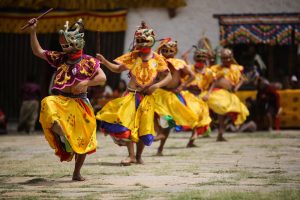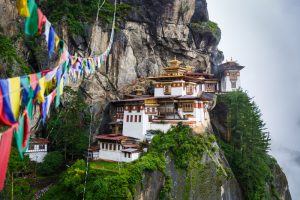 The moment you step off the plane in Bhutan you will face a huge conundrum! You seem to have stepped back in time to life as it was a century ago – and yet you seem also to be in the most progressive country in the world, with philosophies and values we in the western world can only dimly remember or dream about. As Michael Palin comments, ‘There are telephones … and satellite dishes and laptop computers, but they are inside traditional buildings and used by people wearing traditional dress’. We can promise you this will be a very special trip. Everyone who goes, returns enthralled by this secret land.
The moment you step off the plane in Bhutan you will face a huge conundrum! You seem to have stepped back in time to life as it was a century ago – and yet you seem also to be in the most progressive country in the world, with philosophies and values we in the western world can only dimly remember or dream about. As Michael Palin comments, ‘There are telephones … and satellite dishes and laptop computers, but they are inside traditional buildings and used by people wearing traditional dress’. We can promise you this will be a very special trip. Everyone who goes, returns enthralled by this secret land.
Bhutan certainly exudes charm. Here the mountains are magnificent, the air is pure, the forests are dense, the people are friendly and delightful, children are curious and charming; the architecture is unique, the religion exciting, the art superb. There are no beggars and very little crime.
While the Bhutanese themselves are aware that they live in a privileged land, surrounded by nations with terrifying economic and social problems, they also know they are not living in Shangri-La. For most, their day-to-day reality – which consists of household chores, work in the fields and care of livestock – is scarcely mechanised. Religious festivals, pilgrimages and secular holidays are the only moments of rest – hugely anticipated pauses punctuating the agricultural calendar. With about 80% of the people engaged in agriculture or the raising of livestock, Bhutan remains a rural country and the unspoilt beauty of the landscape can seem almost unreal to us, coming from the industrialised world. Houses with brightly-decorated window frames, shingled roofs and lovely carvings; intricately-woven bamboo fences; women weaving outside their houses; a baby snugly warm in the brightly-coloured cloth slung over his mother’s back or laced into the saddle of a horse; yaks browsing in the fields or on rocky mountains, wheat being winnowed – such scenes will remain with you forever. Or it may be the symbols of Bhutan’s religion which leave the deepest impression. Impressive chortens (commemorative monuments) dot the landscape; prayer flags flutter across valleys and outside homes; prayer wheels hum as they are turned – either by respectful hands or the swiftly-running streams – red-robed monks of all ages (yes, even with mobile phones!); glorious monasteries (lakhangs) and centuries-old fortresses (Dzongs) from a time when history was more violent.
 The Bhutanese are fiercely proud of their traditions and see no need to adopt ideas simply because they come from more developed countries. They accept only those concepts which help them improve their way of life and develop their country within the framework of their own traditions without destroying the environment. They are different and intend to remain so.
The Bhutanese are fiercely proud of their traditions and see no need to adopt ideas simply because they come from more developed countries. They accept only those concepts which help them improve their way of life and develop their country within the framework of their own traditions without destroying the environment. They are different and intend to remain so.
“Imagine a country where happiness is the guiding principle of government. Imagine a people who see all life as sacred and the source of their happiness, a nation committed to preserving its culture and whose progress is measured by obtaining Gross National Happiness for its people. Bhutan takes the middle path that balances the needs of man with the powerful spirits of nature.”
That quote from a 2007 documentary produced in Bhutan gives you some idea of what is in front of you as you explore this small, geographically-isolated, utterly magic kingdom, tucked away in the Himalayas.
Bhutan is becoming increasingly known for its visionary and dynamic leadership under its ‘fatherly’ monarch. It holds an uncompromising stand on environmental conservation and is known for the policy of ‘high value, low volume tourism’, rich tradition and cultural heritage, pristine ecology and abundant wildlife. Bhutan limits (strictly) the number of visitors it receives each year, practising a policy of tourism control and putting the accent on traditional values.
In Bhutan you can explore not only the gorgeously-carved and painted shops and houses, but also the totally unspoilt places, such as the Haa Valley, only recently opened to the public. You can picnic beside rivers with water so clear you can count the stones on the bottom; learn about the different sects of Buddhism and visit some of the most glorious of the country’s monasteries with their spectacular art; sample the local dishes (the national dish is chillies and cheese!); join the locals as they visit their revered sacred places, make their handicrafts and take time out for archery competitions. Travel though the country with its glorious scenery- some by van or coach, some on walks and hikes through the countryside with its picturesque rice paddies and wheat fields – to see as much as possible in our time. The highlight of most hikes there will undoubtedly be the Tiger’s Nest, Bhutan’s most stunning monastery. Set 900m straight up from the valley floor, crazily perched on a rocky ledge, it is truly spectacular. On a par with this experience will be one quite different but equally special. We can time your programme so that you can see one of the great local festivals and marvel at the masked dancers and join the local people as they take some well-earned relaxation.
For more details about possible tours of Bhutan or to arrange a bespoke adventure, please get in touch with us.
